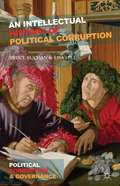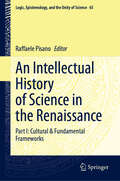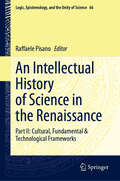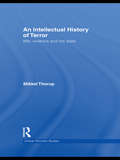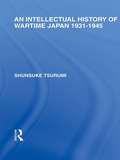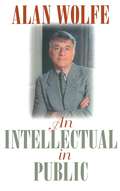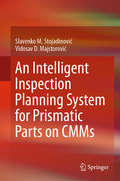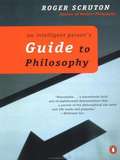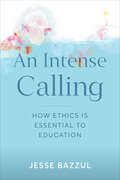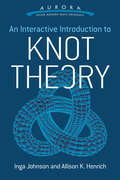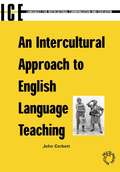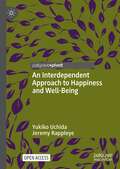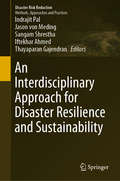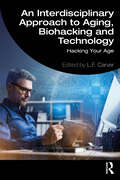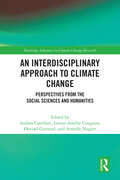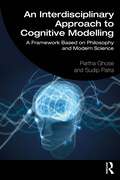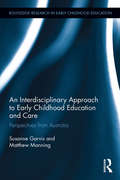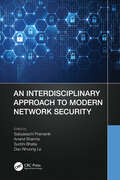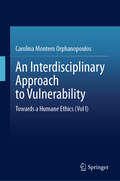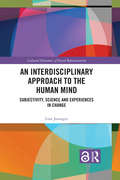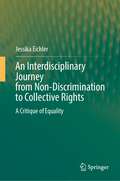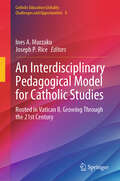- Table View
- List View
An Intellectual History of Political Corruption
by Lisa Hill Bruce BuchanFew concepts have witnessed a more dramatic resurgence of interest in recent year than corruption. It is, however, a concept that dates back to antiquity with this recent popularity representing the latest iteration in a long history of contestation over corruption. In one of the first surveys of the variable contours of meaning invested in the term, from antiquity through to the end of the eighteenth century, this book explores the significant role corruption has played in political discourse through the centuries. It finds that corruption was not always a concept particular to the abuse of public office, but was often applied to more nebulous fears of moral, spiritual and physical degeneration. This book marshals both historical and conceptual analysis to demonstrate a conceptual oscillation between restrictive 'public office' and expansive 'degenerative' connotations of corruption that persisted until the second half of the eighteenth century when the public office conception overtook and finally superseded the degenerative one. The result is a survey that is fundamental to the understanding of modern ideas of corruption and represents an invaluable tool to both students and scholars of the subject.
An Intellectual History of Science in the Renaissance: Part I: Cultural & Fundamental Frameworks (Logic, Epistemology, and the Unity of Science #65)
by Raffaele PisanoThis first of a two-part volume (Book I) deals with a unit intellectual cultural history of science in the Renaissance within fundamental frameworks. An intellectual cultural history of science examines how human and their intellectual experiences have been expressed in, and emerged by scientific ideas. Taking into account the excellence of the essays – which cover several branches and disciplines in history and epistemology of science – this book also provides perspectives on the enduring influence of a historiographical tradition, e.g., the emergence of fundamental works on mathematics and geometry, household&’s principal functions, food and culture, clock instrumentation, surgery as a practical branch of medicine. It describes the ways it differently accounted for variation in unlike countries and consequently how its results remain, still nowadays, a debated question, as well as due to constraints preventing an extensive exploration of its remarkable historiography. This volume gathers selected and double peer review contributions by historians of physics/mathematics/science as new fundamental perceptions in the history of science during the Renaissance, ranging across several fields of science within its intellectual and cultural history. The book is an accessible avenue to understanding cultural issues to develop scientific ideas by leading authorities who offer much-needed historical insights into the field of intellectual and fundamental history of science. It provides an absorbing and revealing read for historians, philosophers and scientists alike.
An Intellectual History of Science in the Renaissance: Part II: Cultural, Fundamental & Technological Frameworks (Logic, Epistemology, and the Unity of Science #66)
by Raffaele PisanoThis second of a two-part volume (Book II) extends the historical–scientific inquiry of first-part volume (Book I) by considering other specific case studies within cultural, fundamental & technological frameworks. An intellectual cultural history of science & technology examines how human and their applied sciences-experiences have been expressed in, and trained by ideas and technologies. The contributors explain ways in which the sciences allowed advanced modelling on the one hand, and the development of new technological ideas on the other hand, including methods and theories, institutions, engineering devices/instrumentation and social implications as well. Taking into account the excellence of the essays, the book covers several branches and disciplines in science & technology, e.g., theoretical mathematics and the empirical work, machinery and mechanisms, stored information, transportation, inquiring methods in history and historiography of science & technology. It describes the ways it differently accounted for variation in unlike contexts and consequently how its results remain, still nowadays, a debated question, as well as due to constraints preventing an extensive exploration of its remarkable historiography. The book gathers selected and double peer review contributions by historians of physics/mathematics/engineering/science as new perceptions of the history of science during the Renaissance ranging across several fields of science within its fundamental, cultural & technological history. The volume is an accessible avenue to understanding cultural ideas & technologies by leading authorities who offer much-needed historical insights into the field of and intellectual history of science & technology. It provides an absorbing and revealing read for historians, philosophers, and scientists alike.
An Intellectual History of Terror: War, Violence and the State (Routledge Critical Terrorism Studies)
by Mikkel ThorupThis book investigates terrorism and anti-terrorism as related and interacting phenomena, undertaking a simultaneous reading of terrorist and statist ideologists in order to reconstruct the 'deadly dialogue' between them. This work investigates an extensive array of violent phenomena and actors, trying to broaden the scope and ambition of the history of terrorism studies. It combines an extensive reading of state and terrorist discourse from various sources with theorizing of modernity's political, institutional and ideological development, forms of violence, and its guiding images of self and other, order and disorder. Chapters explore groups of actors (terrorists, pirates, partisans, anarchists, Islamists, neo-Nazis, revolutionaries, soldiers, politicians, scholars) as well as a broad empirical source material, and combine them into a narrative of how our ideas and concepts of state, terrorism, order, disorder, territory, violence and others came about and influence the struggle between the modern state and its challengers. The main focus is on how the state and its challengers have conceptualized and legitimated themselves, defended their existence and, most importantly, their violence. In doing so, the book situates terrorism and anti-terrorism within modernity's grander history of state, war, ideology and violence. This book will be of much interest to students of critical terrorism studies, political violence, sociology, philosophy, and Security Studies/IR in genera Mikkel Thorup is Assistant Professor at the Institute of Philosophy and the History of Ideas, University of Aarhus, Denmark.
An Intellectual History of Wartime Japan: 1931-1945 (Routledge Library Editions: Japan)
by Shunsuke TsurumiWhen this book was published in Japanese in 1982 it was awarded the prestigious Jiro Osaragi Prize. It is an important contribution to the understanding of the mental and spiritual world of Japan just over two generations ago. The author argues that just as the period of isolation up to the middle of the 19th century was crucial for Japan’s development, so the Second World War represented another crucial period for the country. These years were a period of intellectual isolation during which significant development took place.
An Intellectual in Public
by Alan WolfeA new collection of essays from one of the most courageous and honest thinkers writing today "The question of the public intellectual is very much in the air again," writes Alan Wolfe. As one of our eminent social commentators, Wolfe should know; he's been writing, with fierce intellectual independence, about American public and private life since the 1960s. In this new collection of essays spanning seven years of contributions to The New Republic, The New Yorker, Atlantic Monthly, and other prominent publications, Wolfe displays the courage necessary to write honestly--yet free of ideology, cant, and piety--about the things Americans take very seriously. Wolfe thinks big; indeed, the essays in An Intellectual in Public confront many of the most controversial issues of our time: country, God, race, sex, material consumption, and left and right. Beginning and ending the book are original essays describing the public intellectual's role, and how Wolfe believes that role ought to be filled. An Intellectual in Public is not only a demonstration of Wolfe's pointed analytical skills but a testament to his belief that "severely ideological thinking" is inappropriate for some of our most difficult problems, and that "neither the right nor the left can speak for all of America. " Alan Wolfe is the director of the Boisi Center for Religion and American Public Life and also Professor of Political Science at Boston College. He is the author of over a dozen books, including One Nation After All: What Middle Class Americans Really Think About: God, Country, Family, Racism, Welfare, Immigration, Homosexuality, Work, the Right, the Left and Each Other.
An Intelligence in Our Image: The Risks of Bias and Errors in Artificial Intelligence
by William Welser Iv Osonde A. OsobaMachine learning algorithms and artificial intelligence influence many aspects of life today and have gained an aura of objectivity and infallibility. The use of these tools introduces a new level of risk and complexity in policy. This report illustrates some of the shortcomings of algorithmic decisionmaking, identifies key themes around the problem of algorithmic errors and bias, and examines some approaches for combating these problems.
An Intelligent Customer Complaint Management System with Application to the Transport and Logistics Industry (Springer Theses)
by Alireza FaedThis thesis addresses the issue of customer complaints in the context of Customer Relationship Management (CRM). After a comprehensive survey of the current literature on CRM, the thesis describes the development of a new intelligent CRM (I-CRM) framework, which integrates text analytics, type mapping, SPSS, structural equation modeling, and linear and fuzzy approaches. This new methodology, in contrast to previous ones, is able to handle customer complaints with respect to different variables, thus allowing organizations to find their key customers and key complaints, and to address and provide solution to the major complaints of the key customers, hence promoting business development. The thesis also describes the successful application of the method to a real-world case, represented by the immeasurable truck drivers complaints at the Fremantle port in Western Australia.
An Intelligent Inspection Planning System for Prismatic Parts on CMMs
by Vidosav D. Majstorović Slavenko M. StojadinovićThis book examines an intelligent system for the inspection planning of prismatic parts on coordinate measuring machines (CMMs). The content focuses on four main elements: the engineering ontology, the model of inspection planning for prismatic parts on CMMs, the optimisation model of the measuring path based on an ant-colony approach, and the model of probe configuration and setup planning based on a genetic algorithm. The model of inspection planning for CMMs developed here addresses inspection feature construction, the sampling strategy, probe accessibility analysis, automated collision-free operation, and probe path planning. The proposed model offers a novel approach to intelligent inspection, while also minimizing human involvement (and thus the risk of human error) through intelligent planning of the probe configuration and part setup. The advantages of this approach include: reduced preparation times due to the automatic generation of a measuring protocol; potential optimisation of the measuring probe path, i.e., less time needed for the actual measurement; and increased planning process autonomy through minimal human involvement in the setup analysis and probe configuration.
An Intelligent Person's Guide to Philosophy
by Roger Scruton"Philosophy's the 'love of wisdom', can be approached in two ways: by doing it, or by studying how it has been done," so writes the eminent philosopher Roger Scruton. In this user-friendly book, he chooses to introduce philosophy by doing it. Taking the discipline beyond theory and "intellectualism," he presents it in an empirical, accessible, and practical light. The result is not a history of the field but a vivid, energetic, and personal account to guide the reader making his or her own venture into philosophy. Addressing a range of subjects from freedom, God, reality, and morality, to sex, music, and history, Scruton argues philosophy's relevance not just to intellectual questions, but to contemporary life. .
An Intense Calling: How Ethics Is Essential to Education
by Jesse BazzulPositing that education is a movement from one way of being to another, more desirable one, An Intense Calling argues that ethics should be the prime focus for the field of education. The book locates ethics, education, and justice in human subjectivity and describes education as a necessary practice for ethical reflexivity, change, and becoming (ethically) different. It also situates ethics as something that exceeds subjectivity, thereby engaging ethics as a material phenomenon through topics such as aesthetics and solidarity with non-humans. Jesse Bazzul explores various concepts in the book including power, biopolitics, the commons, subjectivity, and materiality, and draws from over twenty years of experience teaching in different countries including Canada, Ireland, the United States, China, and Ukraine. Taking a wide-ranging philosophical approach, the book entangles ethics, urgent political issues, and pressing educational contexts of the twenty-first century. In doing so, An Intense Calling maintains that ethics is the core of education because education involves finding better ways of living and being in the world.
An Interactive Introduction to Knot Theory
by Allison K. Henrich Inga JohnsonThis well-written and engaging volume, intended for undergraduates, introduces knot theory, an area of growing interest in contemporary mathematics. The hands-on approach features many exercises to be completed by readers. Prerequisites are only a basic familiarity with linear algebra and a willingness to explore the subject in a hands-on manner.The opening chapter offers activities that explore the world of knots and links — including games with knots — and invites the reader to generate their own questions in knot theory. Subsequent chapters guide the reader to discover the formal definition of a knot, families of knots and links, and various knot notations. Additional topics include combinatorial knot invariants, knot polynomials, unknotting operations, and virtual knots.
An Intercultural Approach to English Language Teaching
by John CorbettIntercultural language education has redefined the modern languages agenda in Europe and North America. Now intercultural learning is also beginning to impact on English Language Teaching. This accessible book introduces teachers of EFL to intercultural language education by describing its history and theoretical principles, and by giving examples of classroom tasks.
An Interdependent Approach to Happiness and Well-Being
by Jeremy Rappleye Yukiko UchidaThis open access book examines an interdependent approach to happiness and well-being, one that contrasts starkly with dominant approaches that have originated from Western culture(s). It highlights the diversity of potential pathways towards happiness and well-being globally, and answers calls - voiced in the UN’s Sustainable Development Goals - for more socially and environmentally sustainable models.Leading global organizations including the OECD, UNICEF, and UNESCO are now proposing human happiness and well-being as a more sustainable alternative to a myopic focus on GDP growth. Yet, the definition of well-being offered by these organizations derives largely from the philosophies, social sciences, and institutional patterns of Europe and the United States. Across seven chapters this book carefully probes the inadequacy of these approaches to well-being globally and reveals the distorting effect this has on how we imagine our world, organize institutions, and plan our collective future(s). It shares a wealth of evidence and examples from across East Asia - a region where interdependence remains foregrounded - and concludes by provocatively arguing that interdependence may provide a more sustainable approach to happiness and well-being in the 21st century. A timely and accessible book, it offers fresh insights for scholars and policymakers working in the areas of psychology, health, sociology, education, international development, public policy, and philosophy.This is an open access book.
An Interdisciplinary Approach for Disaster Resilience and Sustainability (Disaster Risk Reduction)
by Sangam Shrestha Indrajit Pal Iftekhar Ahmed Jason Von Meding Thayaparan GajendranThis book includes selected papers presented at the international expert forum on “Mainstreaming Resilience and Disaster Risk Reduction in Education,” held at the Asian Institute of Technology, Thailand on 1–2 December 2017. The journey towards disaster risk reduction and resilience requires the participation of a wide array of stakeholders ranging from academics to policymakers, to disaster managers. Given the multifaceted and interdependent nature of disasters, disaster risk reduction and resilience require a multidisciplinary problem-solving approach and evidence-based techniques from the natural, social, engineering, and other relevant sciences.Traditionally, hazard and disaster-related studies have been dominated by the engineering and social science fields. In this regard, the main purpose of this book is to capture the multidisciplinary and multisectoral nature of disaster risk reduction, and to gather existing data, research, conceptual work, and practical cases regarding risk reduction and its ties to sustainable development under a single “umbrella.” Along with the sustainability aspect, the book also links disaster risk reduction with development, technology, governance, education, and climate change, and includes discussions on challenges, solutions, and best practices in the mainstreaming of disaster risk reduction.
An Interdisciplinary Approach to Aging, Biohacking and Technology: Hacking Your Age
by L. F. CarverAn Interdisciplinary Approach to Aging, Biohacking and Technology focuses on a broad range of issues that cover everything from the most basic ways technology and biohacking influence people’s everyday lives to concerns about equity, globalization and how we humans produce, consume and are consumed by our technologies.This edited collection looks at the intersection between technology and aging, addressing the ways in which technology affects individuals, groups, local communities and entire populations. Contributions from a range of disciplines including sociology, philosophy, communications, medicine and religion provide interdisciplinary perspectives, addressing questions such as ‘What is the impact of technology on adult bodies, our well-being and our safety?’ The book explores risks such as surveillance technology, body modification and the Internet as well as issues in the aging journey such as the body and its modification; communication, privacy and surveillance; gerontechnology and aging in place. Critically examining the journey of ageing and exploring techniques such as biohacking, this book is for students studying aging and technology, including courses such as psychology, sociology, philosophy, cultural studies, health studies and gerontology. It will also be of interest to scholars who are curious about an interdisciplinary approach to age and technology.
An Interdisciplinary Approach to Climate Change: Perspectives from the Social Sciences and Humanities (Routledge Advances in Climate Change Research)
by Armelle Nugier Andrea Catellani Louise-Amélie Cougnon Øyvind GjerstadThis book offers a comprehensive overview of the ways in which research and perspectives from the social sciences and humanities can be combined for a more effective understanding of climate change and its impacts. Climate change affects all aspects of life, influencing personal lifestyle choices and political perceptions. Beyond legal and political measures, the engagement of individuals and local communities has become essential for necessary systemic change. Understanding the complex human and social dynamics is key to achieving real change, in favour of a resilient and low-carbon future.This book highlights the theoretical and practical contributions of the social sciences and humanities in understanding how humans perceive and respond to climate change, and the ways in which they can be combined to fight climate disruption and its effects. These interdisciplinary approaches draw upon fields such as communication sciences, linguistics, psychology, anthropology, educational sciences, management studies, and philosophy, to explore the nexus between climate change and human and social dynamics in individual, collective, and political actions.Drawing on a wide range of interesting case studies, the book highlights opportunities for collaboration between disciplines by combining methodological and theoretical components and synthesizing the research results. Ultimately, the book demonstrates that a more effective collaboration between the social sciences and humanities is required to fully understand the complexities of our relationship with climate change, and to pave the way to a real ecological transition. The book will be of use to scholars, students, researchers, and practitioners interested in communication studies, psychology, linguistics, sociology, philosophy, management, educational studies, transition studies, and connected fields.
An Interdisciplinary Approach to Cognitive Modelling: A Framework Based on Philosophy and Modern Science
by Partha Ghose Sudip PatraAn Interdisciplinary Approach to Cognitive Modelling presents a new approach to cognition that challenges long-held views. It systematically develops a broad-based framework to model cognition, which is mathematically equivalent to the emerging ‘quantum-like modelling’ of the human mind. The book argues that a satisfactory physical and philosophical basis of such an approach is missing, a particular issue being the application of quantization to the mind for which there is no empirical evidence as yet. In response to this issue, the book adopts a COM (classical optical modelling) approach, broad-based but mathematically equivalent to quantum-like modelling while avoiding its problematic features. It presents a philosophically informed and empirically motivated mathematical model of cognition, mainly concerning decision-making processes. It also deals with applications to different areas of the social sciences. It will be of interest to scholars and research students interested in the mathematical modelling of cognition and decision-making, and also interdisciplinary researchers interested in broader issues of cognition.
An Interdisciplinary Approach to Early Childhood Education and Care: Perspectives from Australia (Routledge Research in Early Childhood Education)
by Susanne Garvis Matthew ManningAn Interdisciplinary Approach to Early Childhood Education and Care explores early childhood education and care in Australia from a variety of perspectives, highlighting the complexity of working within the field and the need for a truly interdisciplinary approach. It argues that only a holistic understanding of each perspective will allow a clear future for early childhood education within Australia, and that all government parties should provide better outcomes around policy and provision to ensure the support and development of the sector. Chapters offer insights into how children and families are positioned in educational reform by examining current government policy, as well as individual and collective initiatives. Key paradigms considered include positivist, behavioural, developmental, economic, sociocultural, and postmodern models. Garvis and Manning identify challenges to the field and propose improvements needed to develop an interdisciplinary approach to help close the disadvantage gap on educational outcomes. With recommendations aimed at stakeholders within different disciplines, it is hoped that this book will encourage significant improvements to early childhood education and care within Australia. Providing important insights into the landscape of early childhood education and care, this book will promote new ways of thinking of policy and provision development for the future. As such, it will be of interest to researchers, academics, and postgraduate students in the fields of early years education, education policy and politics, and sociology of education, as well as those studying childcare alongside economics, criminology and sociology.
An Interdisciplinary Approach to Modern Network Security
by Dac-Nhuong Le Surbhi Bhatia Sabyasachi Pramanik Anand SharmaAn Interdisciplinary Approach to Modern Network Security presents the latest methodologies and trends in detecting and preventing network threats. Investigating the potential of current and emerging security technologies, this publication is an all-inclusive reference source for academicians, researchers, students, professionals, practitioners, network analysts and technology specialists interested in the simulation and application of computer network protection. It presents theoretical frameworks and the latest research findings in network security technologies, while analyzing malicious threats which can compromise network integrity. It discusses the security and optimization of computer networks for use in a variety of disciplines and fields. Touching on such matters as mobile and VPN security, IP spoofing and intrusion detection, this edited collection emboldens the efforts of researchers, academics and network administrators working in both the public and private sectors. This edited compilation includes chapters covering topics such as attacks and countermeasures, mobile wireless networking, intrusion detection systems, next-generation firewalls, web security and much more. Information and communication systems are an essential component of our society, forcing us to become dependent on these infrastructures. At the same time, these systems are undergoing a convergence and interconnection process that has its benefits, but also raises specific threats to user interests. Citizens and organizations must feel safe when using cyberspace facilities in order to benefit from its advantages. This book is interdisciplinary in the sense that it covers a wide range of topics like network security threats, attacks, tools and procedures to mitigate the effects of malware and common network attacks, network security architecture and deep learning methods of intrusion detection.
An Interdisciplinary Approach to Vulnerability: Towards a Humane Ethics
by Carolina Montero OrphanopoulosThis book examines vulnerability as an anthropological category, unveiling its profound role in defining human existence. Through an exploration of relationality, dependence, and finitude, it sheds light on how vulnerability shapes human experience and our shared fragility. Engaging with key philosophical, psychological, bioethical and sociological traditions, the volume invites readers to reconsider vulnerability not as a limitation but as a foundation for connection and solidarity. With this approach, the book lays the groundwork for a deeper understanding of human nature, enriched by interdisciplinary dialogue. A precursor to the theological and ethical reflections developed in the second volume, this work redefines vulnerability as central to the human condition.
An Interdisciplinary Approach to the Human Mind: Subjectivity, Science and Experiences in Change (Cultural Dynamics of Social Representation)
by Line JorangerOne of the main aims of modern mental health care is to understand a person's explicit and implicit ways of thinking and acting. So, it may seem like the ultimate paradox that mental health care services are currently overflowing with brain concepts belonging to the external, visible brain-world and that neuroscientists are poised to become new experts on human conduct. An Interdisciplinary Approach to the Human Mind shows that to create care that is truly innovative, mental health care workers must not only ask questions about how their conceptions of human beings and psychological phenomena came into being, but should also see themselves as co-creators of the mystery they seek to solve. Looking at the human being as a being with a biological body and unique subjective experiences, living in a reciprocal relationship with its sociocultural and historical environment, the book will provide examples and theories that show the necessity of an innovating, interdisciplinary mental health care service that manages to adapt its theory and methods to environmental, biological, and subjective changes. To this end, the book will provide an innovating psychology that offers a broad kaleidoscope of perspectives about the relations between the history of psychology, as a scientific discipline oriented to interpret and explain subject and subjectivity phenomenon, and the social construction of subjectified experience. This unique and timely book should be of great interest to critical and cultural psychologists and theorists; clinical psychologists, therapists, and psychiatrists; sociologists of culture and science; anthropologists; philosophers; historians; and scholars working with social and health theories. It should also be essential reading for lawyers, advocates, and defenders of human rights. The Open Access version of this book, available at https://www.taylorfrancis.com/books/9781315309682 has been made available under a Creative Commons Attribution-Non Commercial-No Derivatives 4.0 licence.
An Interdisciplinary Journey from Non-Discrimination to Collective Rights: A Critique of Equality
by Jessika EichlerThis book develops a critique of the equality paradigms and principles to be found in the majority of today’s legal orders. It accompanies the reader taking her/him/x from a critique of non-discrimination and equality to the ‘opposite’ end of the spectrum, that is, to collective rights, collectivization processes and a manifestation of recognition that is based on difference. This interdisciplinary, theoretical journey explores a multiplicity of (legal) orders in terms of how they provide spaces of articulation for ‘difference’. The book draws, emblematically, on the rights of indigenous peoples as well as recognized and unrecognized cultural, ethnic, linguistic and religious minorities. The book thereby builds on legal and political theory, which ultimately proves essential given the dedicated objective of the book, that is, to introduce a variety of recognition principles and what the author terms ‘scales of collectivization’, which facilitate a better understanding of collective rights and further ways to capture, define and ultimately measure these rights.
An Interdisciplinary Pedagogical Model for Catholic Studies: Rooted in Vatican II, Growing Through the 21st Century (Catholic Education Globally: Challenges and Opportunities #4)
by Ines A. Murzaku Joseph P. RiceThis book offers a vision of an integrated Humanities curriculum, potentiated by the depth and diversity of perspectives that Catholic Studies contributes to both Catholic and secular universities. The result, inspired in various magisterial documents, is a more profound, relevant, and enduring college learning experience. It considers Catholic Studies as a response to the rich legacy of Vatican II, and its opening to contemporary culture, as it is expressed in Catholic education. It answers the dual call of the Declaration on Christian Education Gravissimum Educationis (GE) for cooperation and collaboration among Catholic institutions of higher learning, and among faculty of the different scholarly disciplines. This book displays the interdisciplinary breadth and disciplinary depth of Catholic Studies, while providing a window into the practical insights gained by experts in research, program design, and teaching in a flourishing Catholic Studies program that has inspired the founding of the Seton Hall University core curriculum. Complemented by the contributions of Catholic Studies experts from outside Seton Hall, this book serves as a pedagogical model for researchers and educators to consider and emulate, nationally and internationally, an interdisciplinary Catholic Studies model as a way to recuperate theology; stop the siege of the humanities; and teach humanities in contact and communication with other disciplines, including STEM and other vocation-oriented fields. In this overall context, this book serves as a guide and a reference for new and established programs of Catholic Studies, nationally and internationally. It seeks to extend a conversation, in the style of a symposium, to campuses and cultural contexts in the United States and internationally.
An Interest Rate Defense of a Fixed Exchange Rate?
by Olivier Jeanne Robert P. FloodA report from the International Monetary Fund.
